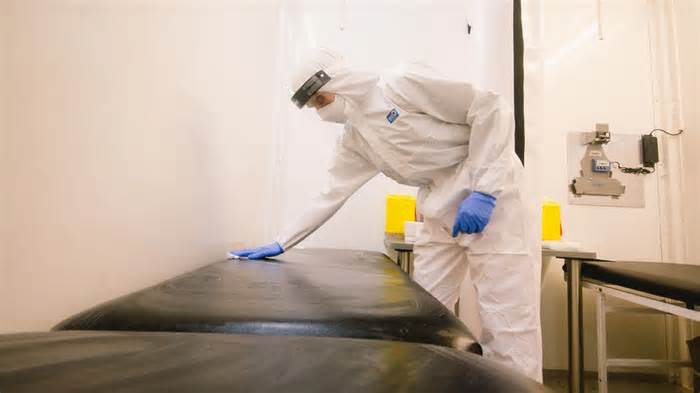Germany’s Federal And State health ministers have decided to set up free coronavirus testing centres at all German airports, to curb the risk of a second wave of Covid-19 infections sparked by returning travelers.
Free tests will be offered to holidaymakers returning from high-risk countries on a voluntary basis. Those who opt out must quarantine for two weeks as before.
All other travelers arriving from “no-risk” countries can choose to get tested within three days reports German television, ZDF.
The announcement comes after Germany recorded its highest number of daily cases for two months, the broadcaster says. According to the Robert Koch Institute, 815 new infections were recorded on Friday. That’s the sharpest spike since mid-May says Germany’s federal agency for disease control and prevention.
The alarm bells have been raised over the “loutish behavior” by some German tourists in Mallorca and Bulgaria ZDF reports. “Germany has so far done a better job than many countries at containing the virus thanks to early and extensive testing.”
But pictures of holidaymakers partying in Mallorca, ignoring social distancing rules, have sparked great concern of a second wave, imported back home by travelers.
For Berlin’s health minister, Dilek Kalayci, the risk of new infections linked to traveler conduct is very high. Some federal states are already reporting rising infection numbers due to “returnees” she told TV show Tagesschau. (Berlin will introduce airport tests from next week).
To combat that threat, Germany’s Health Minister, Jens Spahn, and counterparts from each of Germany’s 16 states agreed on the airport testing in a meeting in Bonn.
“Increasing travel increases the risk of more infections being brought back into Germany,” Spahn said.
Tests are already being conducted at some airports, including Frankfurt and Munich. Until now they have cost from €59 to €190. Facilities vary from walk-in centres to mobile testing stations. The tests are also intended for tourists to show on arrival in countries demanding them.
As testing centres are unfurled nationwide, the government will foot the bill at the outset– though the cost may be passed on to holidaymakers via ticket prices in the future according to Reuters.
At least two of Germany’s Prime Ministers (from Bavaria and Saxony), had campaigned for mandatory tests. That idea was rejected.
To prevent the situation spiralling out-of-control, the health ministers decided to:
The Robert Koch Institute has classified more than 100 countries worldwide for increased risk of infection. They include:
Until now German citizens, residents and others returning from these countries have faced mandatory 14 day home isolation. Unless they can show a negative test, that rule stays.
Exit cards are also to be reintroduced, to help track corona infections. These are handed out to those arriving from abroad, but also for cross-border traffic by ship, bus and train, according to Kalayci.
Anyone who comes to Germany from a risk area must fill out and hand in such a form.
There’ll also be “random checks” she said at land borders. Anyone arriving from a high-risk area will be reminded of quarantine obligations.
You can also follow me on Instagram, and my website
I have three decades of experience as a journalist, foreign correspondent and travel writer-photographer. Working for print, digital and radio outlets on four continents,
I have three decades of experience as a journalist, foreign correspondent and travel writer-photographer. Working for print, digital and radio outlets on four continents, I am also a veteran hotel industry reporter and author of travel guides and cultural histories to Australia, France, Italy, Spain, Switzerland and Borneo. Very often on the road between my Paris and Australian bases, I write for Forbes with a globetrotters perspective and newsy edge on travel, culture, hotels, art and architecture. My passion is capturing the distinctive people, places and events I encounter along the way, both in words and pictures. I hold a degree in Professional Writing from Canberra University, an MA in European Journalism from the Université Robert Schuman Strasbourg, and am a member of the Society of American Travel Writers. A love for my wild home-island of Tasmania fuels my commitment to sustainable travel and conservation.

